Sniff and search is no longer the default for police in some of the 33 states that have legalized marijuana.
Traditionally, an officer could use the merest whiff of weed to justify a warrantless vehicle search, and whatever turned up — pot, other kinds of illegal drugs, something else the motorist wasn't allowed to have — could be used as evidence in court.
That's still true in the minority of states where marijuana remains verboten. But the legal analysis is more complicated in places where pot has been approved for medical or adult use, and courts are beginning to weigh in. The result is that, in some states, a police officer who sniffs out pot isn't necessarily allowed to go through someone's automobile — because the odor by itself is no longer considered evidence of a crime.
"It's becoming more difficult to say, 'I smell marijuana, I can search the car.' It's not always an automatic thing," said Kyle Clark, who oversees drug impairment recognition training programs at the International Association of Chiefs of Police.
For nearly 100 years, the U.S. Supreme Court has recognized an "automobile exception" to the Fourth Amendment's ban on unreasonable searches and seizures, giving law enforcement the right to conduct a warrantless search if there is reason to suspect a vehicle is hiding contraband or evidence of a crime. Police have long used the exception to conduct vehicle searches based on the pungent, distinctive odor of pot.
Increasingly, motorists in states where marijuana is legal in some form are pushing back when police insist on a search — especially if that search yields evidence of a crime.
Last month, a Pennsylvania judge declared that state police didn't have a valid legal reason for searching a car just because it smelled like cannabis, since the front-seat passenger had a medical marijuana card. The search yielded a loaded handgun and a small amount of marijuana in an unmarked plastic baggie — evidence the judge suppressed.
"The 'plain smell' of marijuana alone no longer provides authorities with probable cause to conduct a search of a subject vehicle," Lehigh County Judge Maria Dantos wrote, because it's "no longer indicative of an illegal or criminal act." She said that once the passenger presented his medical marijuana card, it was "illogical, impractical and unreasonable" for troopers to conclude a crime had been committed.
Prosecutors have appealed the ruling, arguing the search was legal under recent state Supreme Court precedent. But they acknowledge that marijuana odor is an evolving issue in the courts.
"We want to get it right," said Heather Gallagher, chief of appeals in the district attorney's office. "We need guidance, so law enforcement knows what to do."
Other states' courts have curtailed searches based on odor.
Massachusetts' highest court has said repeatedly that the smell of marijuana alone cannot justify a warrantless vehicle search. In Vermont, the state Supreme Court ruled in January that the "faint odor of burnt marijuana" didn't give state police the right to impound and search a man's car. Colorado's Supreme Court ruled in May that because a drug-detection dog was trained to sniff for marijuana — which is legal in the state — along with several illegal drugs, police could not use the dog's alert to justify a vehicle search.
"Smell alone is gradually becoming no excuse for getting around the Fourth Amendment," said Keith Stroup, legal director of the National Organization for the Reform of Marijuana Laws. "It's a major development, and it's going to provide a layer of protection that we lost sometime in the past."
But not every court has ruled against sniff and search.
Maryland's high court quoted the title of Bob Dylan's "The Times They Are A-Changin'" in ruling last month that police did an unlawful body search of a motorist whose car smelled of marijuana and contained a joint on the center console. But the court also decided that police were entitled to search the car itself, noting that marijuana is still considered contraband despite the state's medical marijuana program, and people have a "diminished expectation of privacy" in an automobile.
Judges have also ruled that marijuana odor can be used in conjunction with other factors to support a search. If the smell is overpowering, for example, an officer might conclude the motorist has a quantity of cannabis far in excess of what's allowed. Driving under the influence of marijuana is illegal in all 50 states, so police are free to search the car of a driver who shows signs of impairment.
The longstanding federal ban on marijuana, and whether a state's marijuana law is broad or narrow in scope, are additional factors that courts have considered, said Alex Kreit, visiting professor at the Drug Enforcement and Policy Center at Ohio State University's law school.
On patrol, some officers are taking heed of the changing landscape.
In Michigan, medical marijuana patient Craig Canterbury said he produced his ID card after state police told him they smelled marijuana in his van during a traffic stop last year.
"They looked at the card, made sure it was legal, and that was that," Canterbury said. He said he wouldn't have agreed to a vehicle search "because I had shown we were legal."
When David Boyer, former Maine political director of the Marijuana Policy Project, was pulled over for speeding last year, the officer said she smelled marijuana in his car. Boyer, who said he had consumed cannabis at a friend's house several hours earlier, reminded the officer it was legal in Maine and told her he wasn't under the influence.
"She pushed back a little bit on it but ultimately, I just got the speeding ticket," Boyer said.
The officer didn't ask to search the car.
SHANGHAI (AP) — U.S. Secretary of State Antony Blinken raised what the U.S. describes as unfair Chinese trade practices during his first full day of meetings in China on Thursday with local government officials in the financial hub of Shanghai.
Blinken met with the city's top official, Communist Party Secretary Chen Jining, and “raised concerns about (Chinese) trade policies and non-market economic practices," the State Department said in a statement.
It said he stressed that the United States seeks healthy economic competition with China and "a level playing field for U.S. workers and firms operating in China.”
“The two sides reaffirmed the importance of ties between the people of the United States and (China), including the expansion of exchanges between students, scholars, and business,” it said.
China's multibillion-dollar trade surplus with the U.S. along with accusations of intellectual property theft and other practices seen as discriminating against U.S. businesses in China have long been a source of friction in relations.
China, for its part, has objected strongly to U.S. accusations of human rights abuses and Washington's support for Taiwan, the self-governing island that Beijing considers its own territory and warns could be annexed by force.
Blinken also spoke with students and business leaders before flying to Beijing for what are expected to be contentious talks with national officials, including Foreign Minister Wang Yi and possibly President Xi Jinping.
Blinken arrived in Shanghai on Wednesday shortly before U.S. President Joe Biden signed a $95 billion foreign aid package that has several elements likely to anger Beijing, including $8 billion to counter China’s growing aggressiveness toward Taiwan and in the South China Sea. It also seeks to force TikTok’s China-based parent company to sell the social media platform.
China has railed against U.S. assistance to Taiwan and immediately condemned the aid as a dangerous provocation. It also strongly opposes efforts to force TikTok’s sale.
Still, the fact that Blinken made the trip — shortly after a conversation between Biden and Xi, a visit to China by Treasury Secretary Janet Yellen and a call between the U.S. and Chinese defense chiefs — is a sign the two sides are at least willing to discuss their differences.
“I think it’s important to underscore the value — in fact, the necessity — of direct engagement, of speaking to each other, laying out our differences, which are real, seeking to work through them,” Blinken told Chen.
“We have an obligation for our people, indeed an obligation to the world, to manage the relationship between our two countries responsibly,” he said. “That is the obligation we have, and one that we take very seriously.”
Chen agreed with that sentiment and said the recent Biden-Xi call had helped the “stable and healthy development of our two countries’ relationship.”
“Whether we choose cooperation or confrontation affects the well-being of both peoples, both countries, and the future of humanity,” he said.
Chen added that he hoped Blinken was able to get a “deep impression and understanding” of Shanghai, a city of skyscrapers, ports and more than 25 million people that is a magnet for commercially ambitious young people from China and abroad.
Most recently, the U.S. has raised concerns that potential overcapacity in Chinese industries — such as electric vehicles, steel and solar panels — might crowd out U.S. and other foreign manufacturers.
Shortly after arriving, Blinken attended a Chinese basketball playoff game between the local Shanghai Sharks and the Zhejiang Golden Bulls, with the home team losing in the last seconds in a 121-120 nailbiter.
With the U.S. presidential race heating up, it’s unclear what ramifications a victory for either Biden or former President Donald Trump might have for relations. But Trump could deepen a trade war he started during his first term. His tough rhetoric on China and isolationist approach to foreign policy could ramp up uncertainties.

U.S. Secretary of State Antony Blinken, center, with NYU Shanghai Vice Chancellor Jeffrey Lehman, back right, talks to students at NYU Shanghai, Thursday, April 25, 2024, in Shanghai, China. (AP Photo/Mark Schiefelbein, Pool)
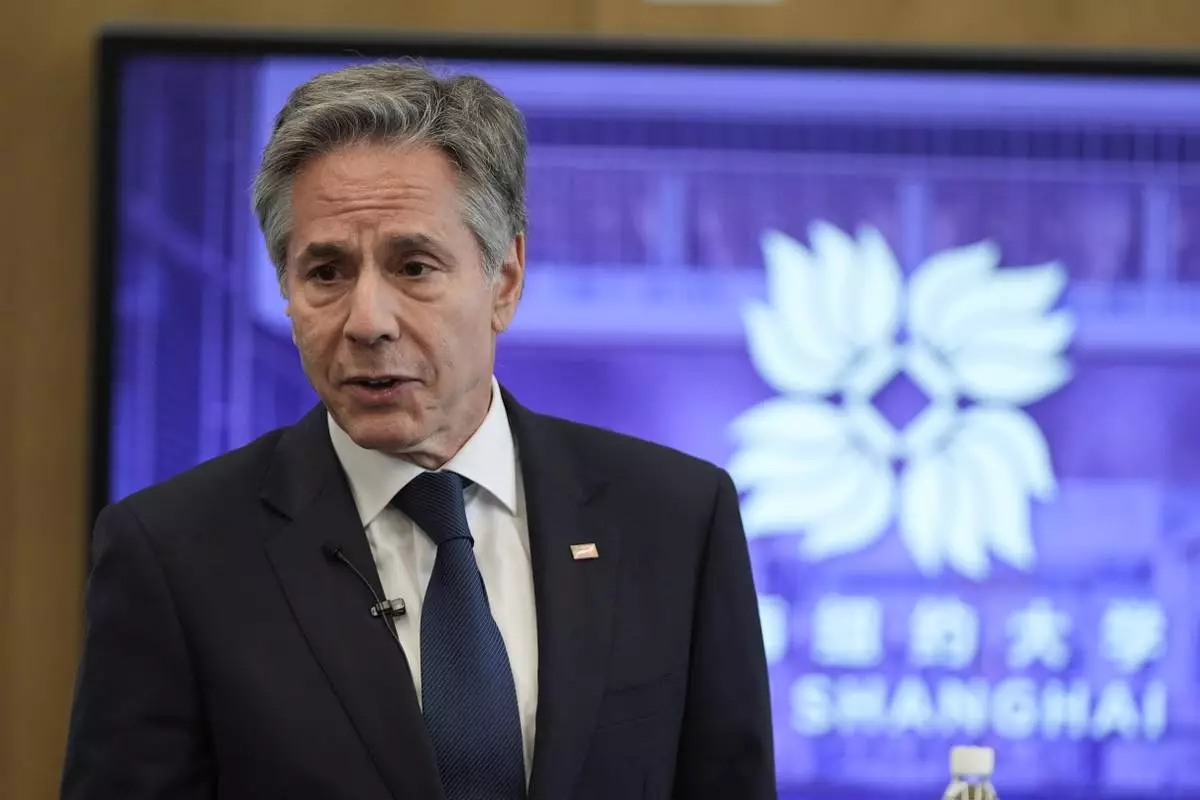
U.S. Secretary of State Antony Blinken talks to students at NYU Shanghai, Thursday, April 25, 2024, in Shanghai, China. (AP Photo/Mark Schiefelbein, Pool)
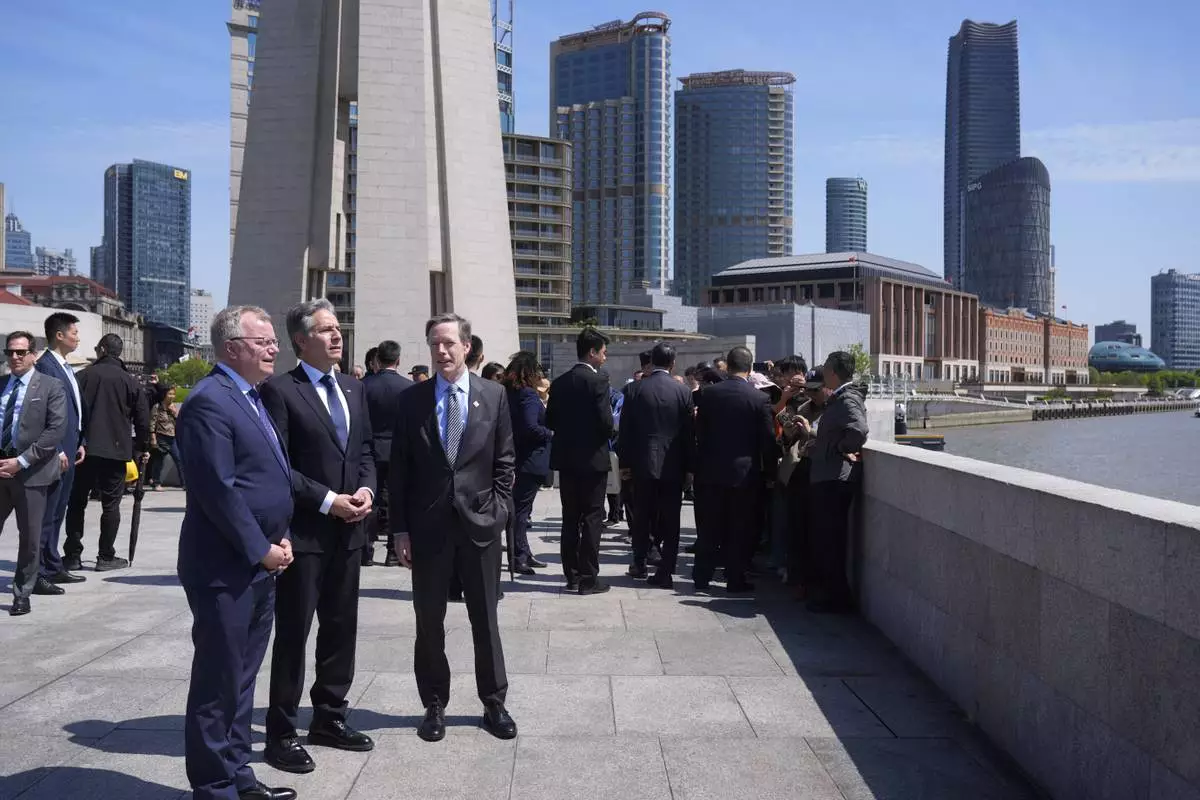
U.S. Secretary of State Antony Blinken, second left, U.S. Ambassador to China Nicholas Burns, third left, and Scott Walker, left, Consul General at the U.S Consulate General in Shanghai, visit a waterfront area called The Bund, Thursday, April 25, 2024, in Shanghai, China. (AP Photo/Mark Schiefelbein, Pool)
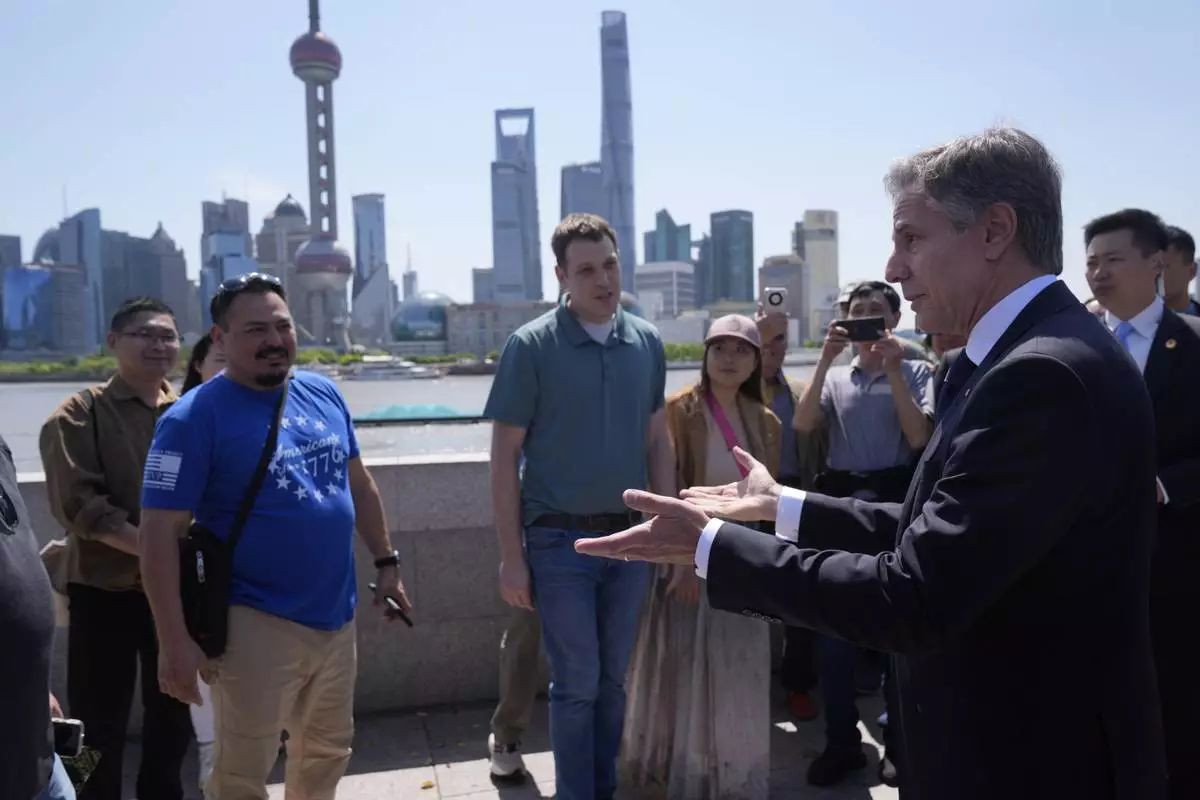
U.S. Secretary of State Antony Blinken, right, talks with U.S. tourists as he walks in a waterfront area called The Bund, Thursday, April 25, 2024, in Shanghai, China. (AP Photo/Mark Schiefelbein, Pool)
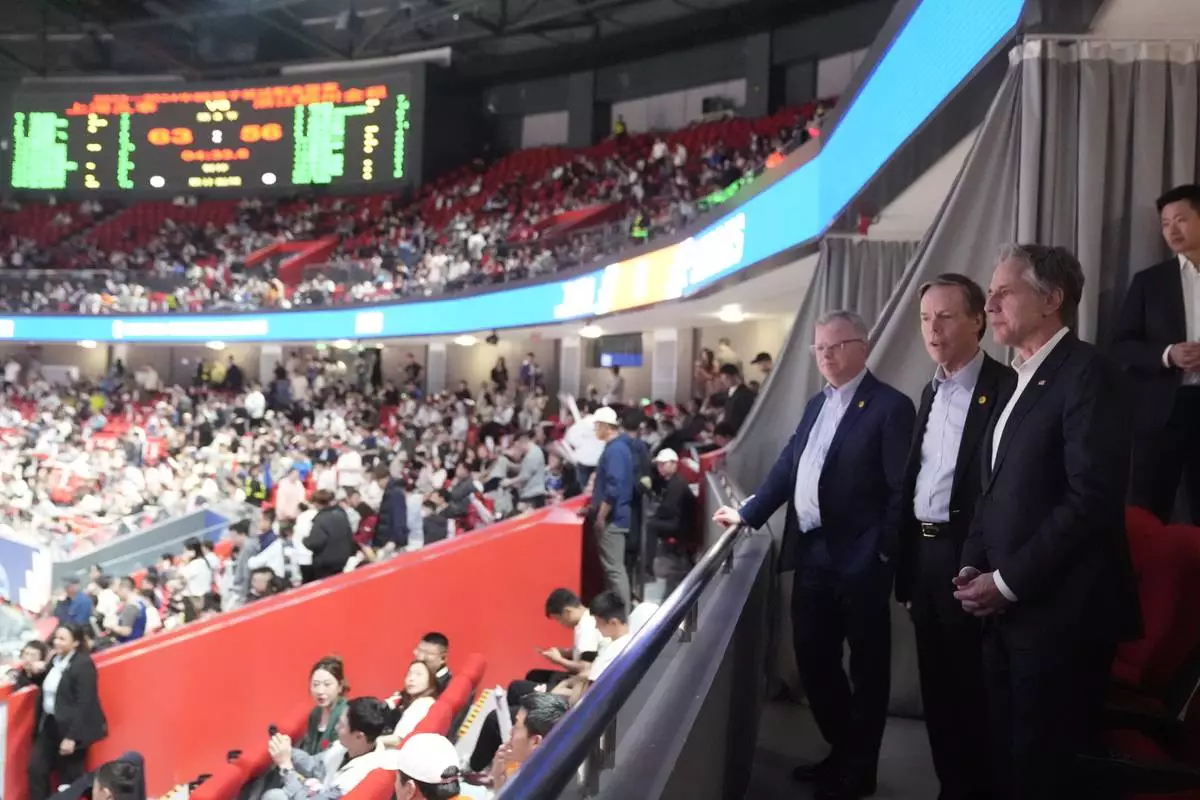
U.S. Secretary of State Antony Blinken talks with U.S. Ambassador to China Nicholas Burns, center, with U.S. Consulate General in Shanghai Scott Walker, left, while attending a basketball game between the Shanghai Sharks and the Zhejiang Golden Bulls at the Shanghai Indoor Stadium, Wednesday, April 24, 2024, in Shanghai, China. (AP Photo/Mark Schiefelbein, Pool)

U.S. Secretary of State Antony Blinken talks with U.S. Ambassador to China Nicholas Burns, center, with U.S. Consulate General in Shanghai Scott Walker, right, while attending a basketball game between the Shanghai Sharks and the Zhejiang Golden Bulls at the Shanghai Indoor Stadium, Wednesday, April 24, 2024, in Shanghai, China. (AP Photo/Mark Schiefelbein, Pool)
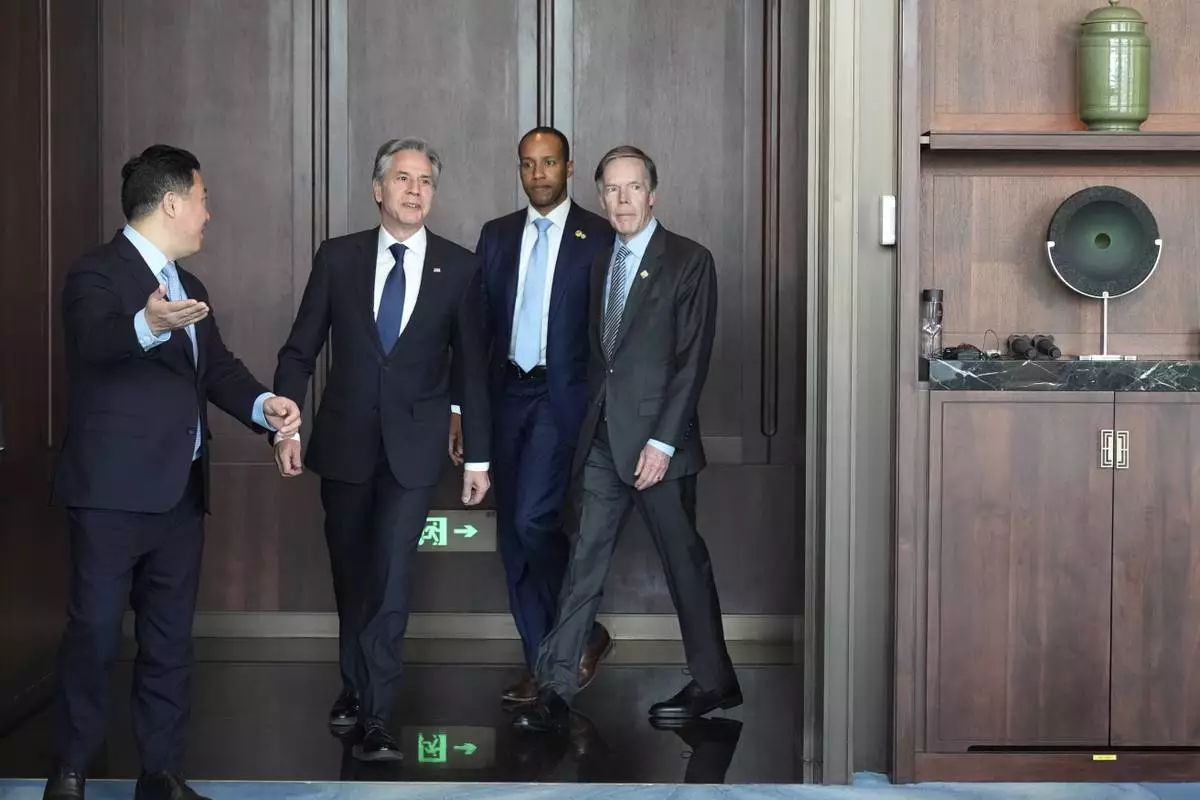
U.S. Secretary of State Antony Blinken, second left, and U.S. Ambassador to China Nicholas Burns, far right, arrive at the Grand Halls to meet with Shanghai Party Secretary Chen Jining on Thursday, April 25, 2024, in Shanghai, China. (AP Photo/Mark Schiefelbein, Pool)
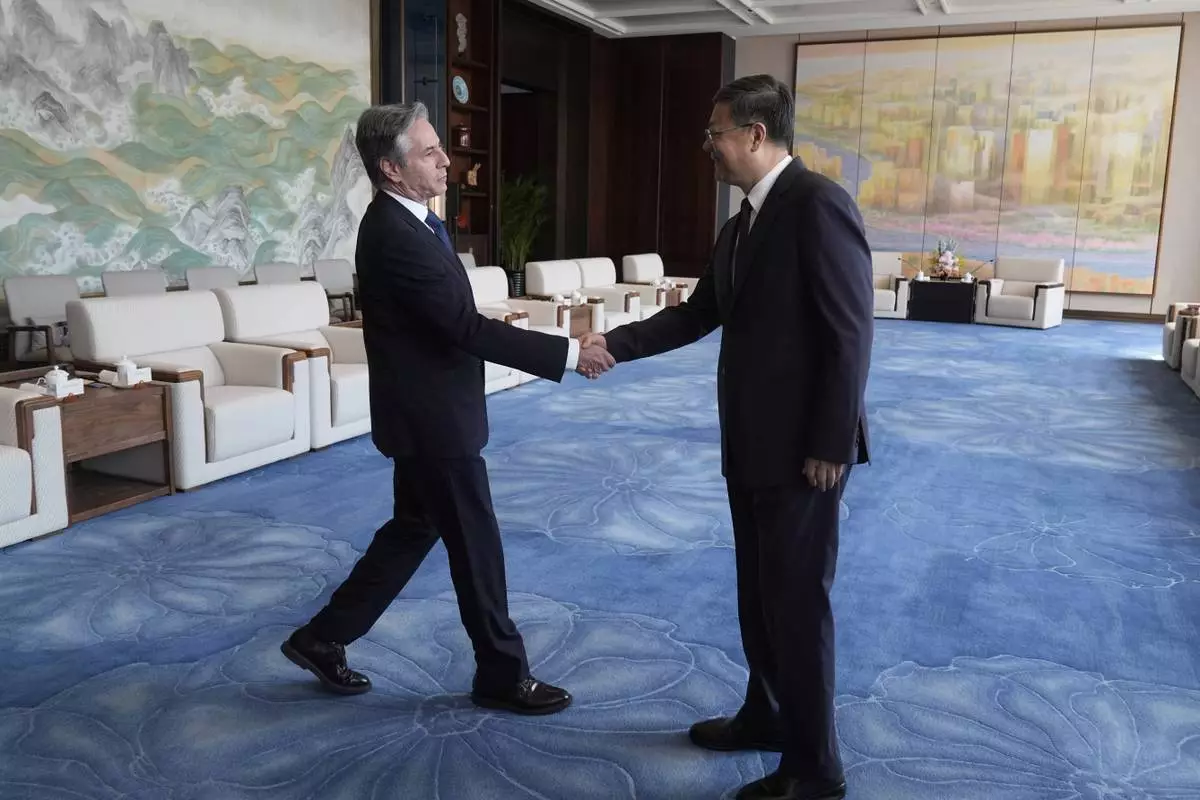
U.S. Secretary of State Antony Blinken, left, shakes hans with Shanghai Party Secretary Chen Jining as they meet at the Grand Halls, Thursday, April 25, 2024, in Shanghai, China. (AP Photo/Mark Schiefelbein, Pool)
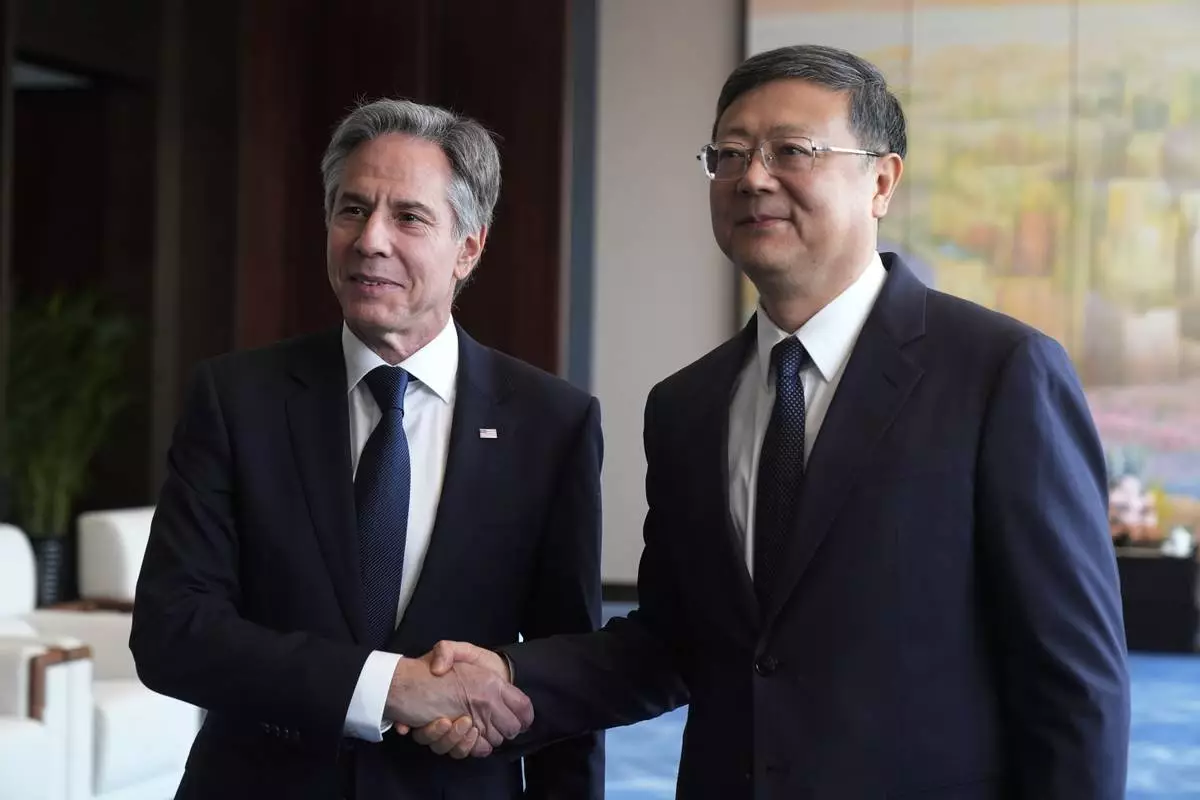
U.S. Secretary of State Antony Blinken, left, meets with Shanghai Party Secretary Chen Jining at the Grand Halls, Thursday, April 25, 2024, in Shanghai, China. (AP Photo/Mark Schiefelbein, Pool)
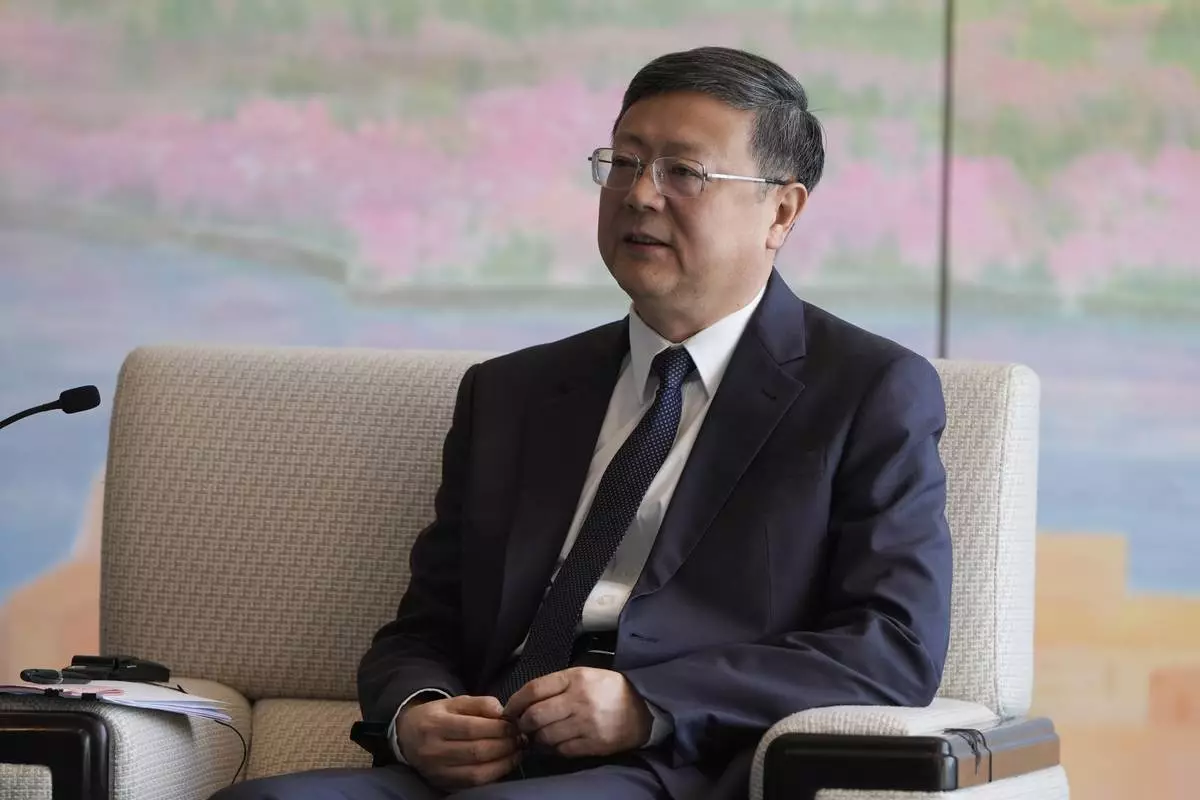
Shanghai Party Secretary Chen Jining talks with U.S. Secretary of State Antony Blinken at the Grand Halls, Thursday, April 25, 2024, in Shanghai, China. (AP Photo/Mark Schiefelbein, Pool)
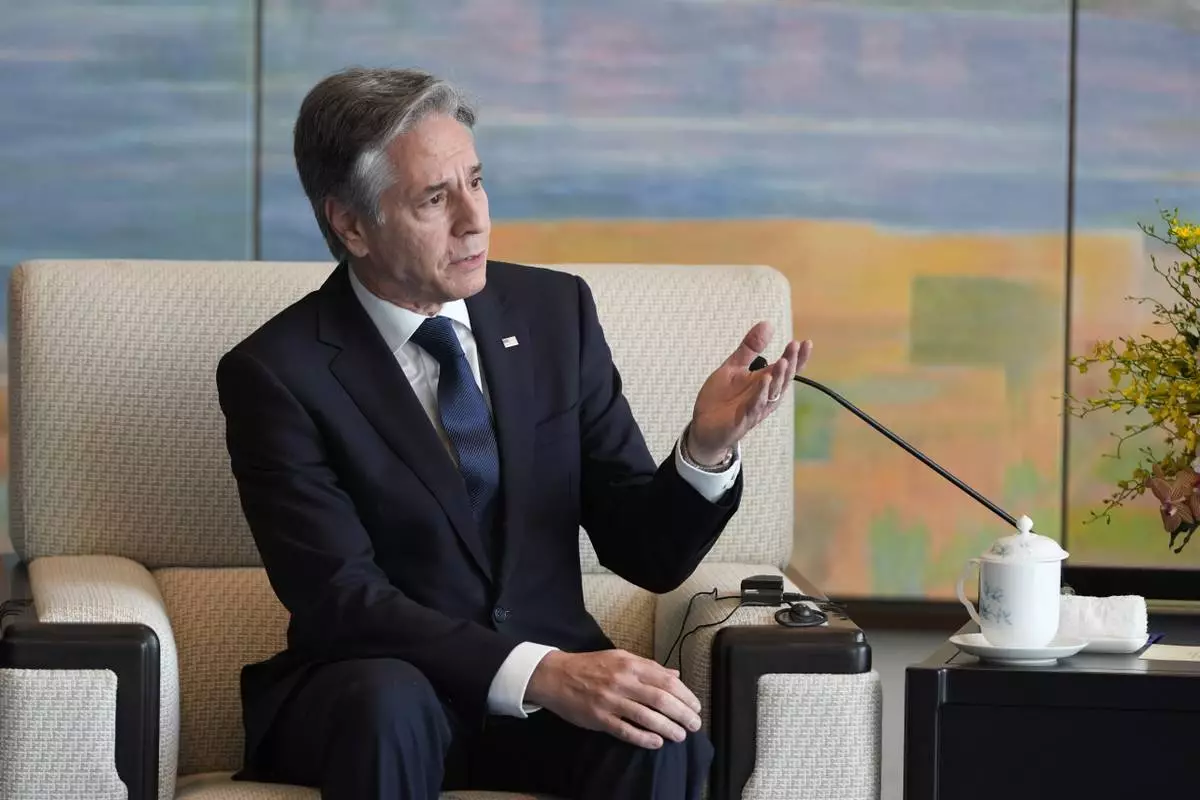
U.S. Secretary of State Antony Blinken talks with Shanghai Party Secretary Chen Jining at the Grand Halls, Thursday, April 25, 2024, in Shanghai, China. (AP Photo/Mark Schiefelbein, Pool)
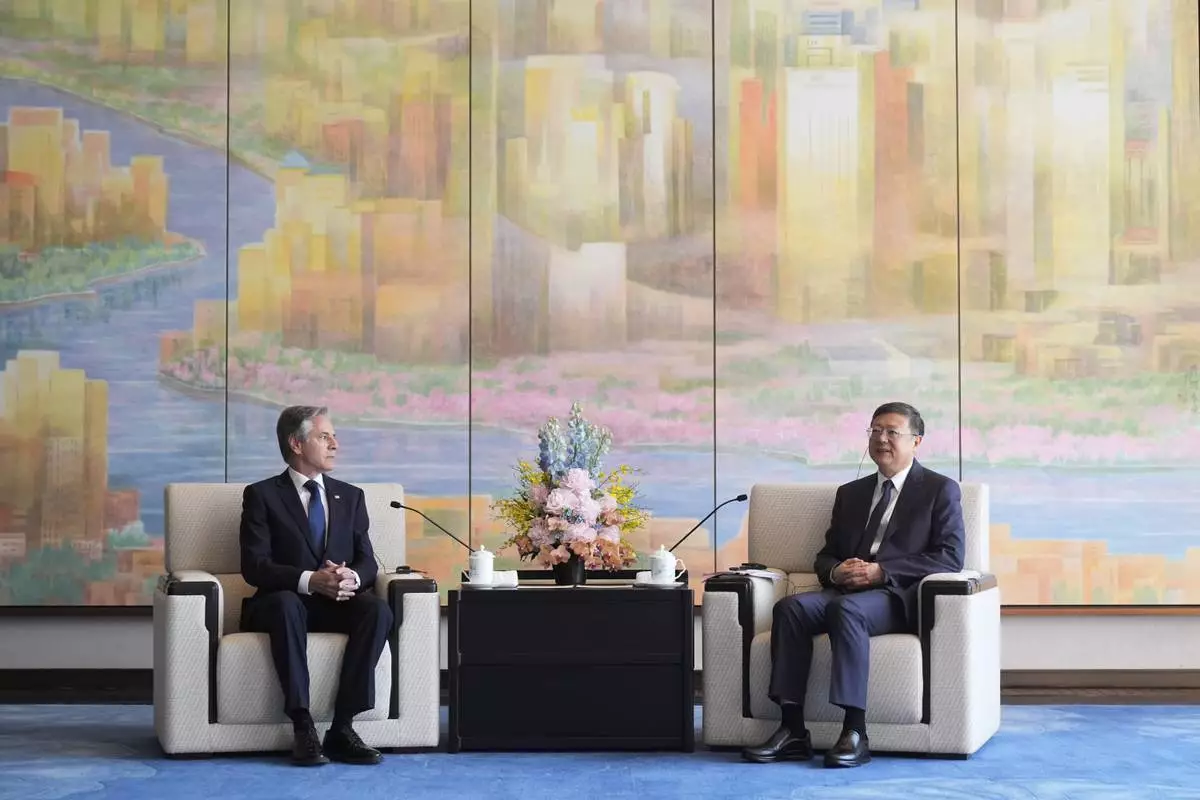
U.S. Secretary of State Antony Blinken, left, talks with Shanghai Party Secretary Chen Jining at the Grand Halls, Thursday, April 25, 2024, in Shanghai, China. (AP Photo/Mark Schiefelbein, Pool)
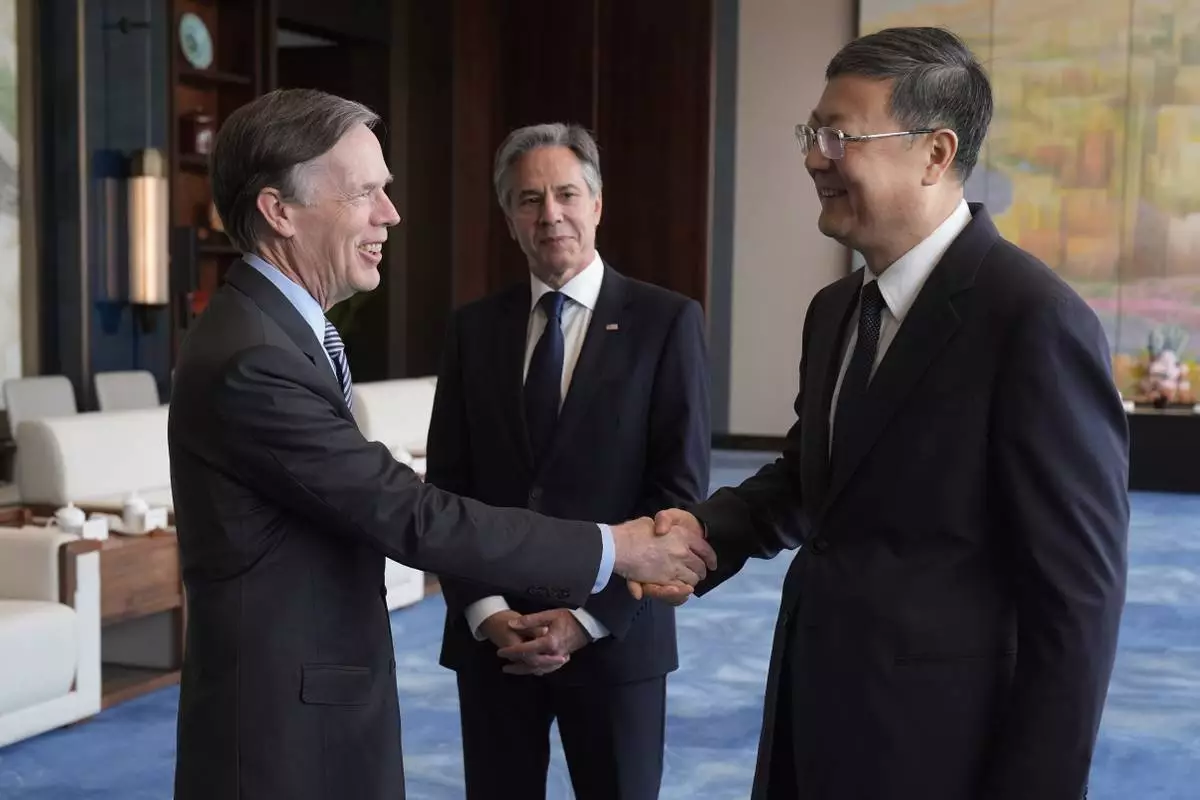
U.S. Secretary of State Antony Blinken, center, watches U.S. Ambassador to China Nicholas Burns, left, shake hands with Shanghai Party Secretary Chen Jining at the Grand Halls, Thursday, April 25, 2024, in Shanghai, China. (AP Photo/Mark Schiefelbein, Pool)






















